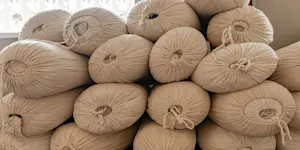What Makes This Word Tick
"Ballyhoo" is one of those lively words that conjures up a sense of excitement and noise. It implies a fuss, a ruckus, or an extravagant attention-grabbing action—often more style than substance. If you picture a carnival barker or a publicity stunt, you're capturing the essence of "ballyhoo."
If Ballyhoo Were a Person…
Ballyhoo would be that charismatic party host who's always ready with a joke and a flair for the dramatic. They might wear flamboyant clothes and wave their arms to draw the crowd in, making every moment feel like the opening night of a Broadway show.
How This Word Has Changed Over Time
Though "ballyhoo" might sound vintage, it hasn't lost its punch. Originally used in the late 19th century, it described noisy, confusing advertising or promotion. Today, it's still about creating a big scene, but with a knowing wink at the potential exaggeration involved.
Old Sayings and Proverbs That Use Ballyhoo
While no classic proverbs feature "ballyhoo," you might say, "It's just a lot of ballyhoo," echoing the idea of much ado about nothing. It captures the skepticism people often have toward overly hyped events.
Surprising Facts About Ballyhoo
"Ballyhoo" isn't just about noise—it's a real species of fish too! The ballyhoo fish swims in the Atlantic Ocean, often used as bait for larger game fish. Imagine that, a word that stirs the airwaves and the seas!
Out and About With This Word
Next time you're at a street fair or witnessing an over-the-top commercial, think of "ballyhoo." It's perfect for moments when there’s more spectacle than substance—the kind of situation where the sizzle outdoes the steak.
Pop Culture Moments Where Ballyhoo Was Used
"Ballyhoo" may pop up in movie reviews or theater critiques, especially when describing something with glitz but possibly lacking depth. It's the kind of word critics love when they want to point out flamboyance without much follow-through.
The Word in Literature
Authors like P.G. Wodehouse would have adored "ballyhoo" for its ability to capture comedic chaos. It's also a word that might fit into the sprawling, descriptive narratives of Dickens, highlighting the bustling energy of his cityscapes.
Moments in History with Ballyhoo
Picture the 1920s flapper scenes—the jazz, the speakeasies, the showbiz extravaganzas. "Ballyhoo" would be at home here, describing the flamboyant spirit and over-the-top excitement that characterized the Roaring Twenties.
This Word Around the World
While "ballyhoo" is quite English, its spirit exists globally. In Spanish-speaking countries, "alboroto" captures similar connotations of a noisy fuss. In the circus-loving cultures of Italy, the concept of "clamore" aligns with this vibrant energy.
Where Does It Come From?
"Ballyhoo's" origin is as mysterious as a magician's trick. It might derive from circus slang, or could harken back further to balihu, an Irish game. Whatever its roots, it’s synonymous with high-energy antics.
How People Misuse This Word
Sometimes people misuse "ballyhoo" to mean just any kind of advertising. While it involves hype, true "ballyhoo" has an element of chaos and flashiness that's essential to its meaning—more show than go.
Words It’s Often Confused With
Hype: While both involve intense promotion, "hype" doesn't suggest the same chaotic energy.
Fanfare: This is about celebratory music or a welcoming, but lacks the chaotic element of "ballyhoo."
Hoopla: Close in meaning, yet "hoopla" is used without the sense of contrived or exaggerated hype.
Additional Synonyms and Antonyms
Synonyms for "ballyhoo" include hoopla, hype, and commotion. On the antonym side, think calm, order, and simplicity—things decidedly not "ballyhoo!"
Want to Try It Out in a Sentence?
The new restaurant opening down the street was accompanied by so much ballyhoo that even the mayor came to see what all the fuss was about!
















